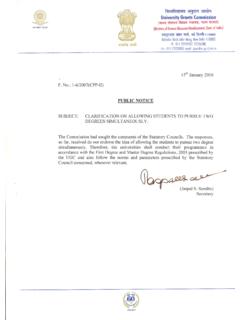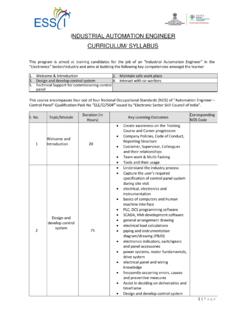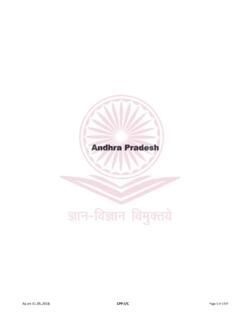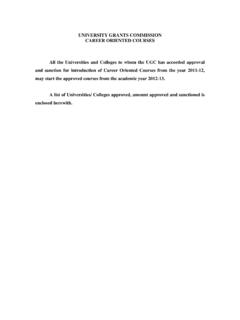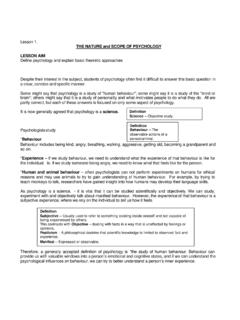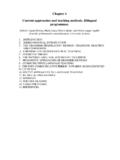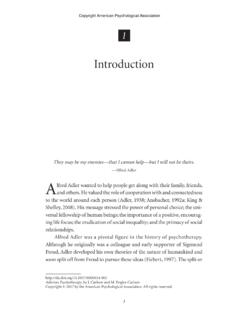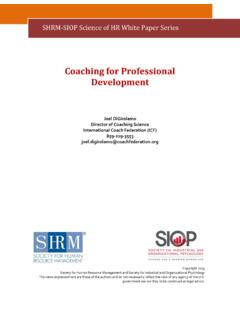Transcription of B. A. (Hons) PSYCHOLOGY - UGC
1 B. A. ( hons ) PSYCHOLOGY The ( hons ) course in PSYCHOLOGY aims at developing an understanding of the growing discipline of PSYCHOLOGY and promoting skill based education. An important goal of this course is to facilitate self-discovery in the students and ensure their enthusiastic and effective participation in responding to the needs and challenges of the contemporary world. The course intends to enable students in developing skills and competencies needed for meeting the challenges and needs of the real world effectively. Hence this syllabus is created keeping in mind the changing nature of the society, educational institutions and the workplace and inculcate the required skills in the students to understand and respond to the same efficiently and effectively.
2 Pedagogy for teaching the ( hons ) Course in PSYCHOLOGY The teaching-learning of the course would be organized through lectures, tutorials, practicals, projects, presentations, workshops, seminars, experiential exercises, and hands on training. Students would be encouraged to develop an understanding of real life issues and participate in the programs and practices in the social context. Practicum is incorporated as an important component in many papers with hands on training in the use of various research methods such as laboratory experiments, field experiments, observation, psychological testing, survey, interview and case study. Use of ICT and mass media and web based sources (like documentaries, videos, films etc.)
3 Is highly recommended to make the teaching-learning process interactive, interesting and fruitful. Evaluation The mode of evaluation would be through a combination of external and internal assessment in the ratio of 75: 25 respectively. Along with routine examinations, classroom participations, class assignments, project work, and presentations would also be a part of the overall assessment of the students. NOTES: Core papers: Theory: 4 classes+1 student presentation per week With Practicals: 2 practicum to be done in a practical paper 4 practical classes per week/per group Each practical group will consist of maximum of 10 students With Tutorials: 1 tutorial per paper per week per group Each tutorial group will consist of 10 students DSE papers: Theory: 4 classes+1 student presentation per week Practicals: 1 practicum to be done in a practical paper 2 practical classes per week/per group Each practical group will consist of maximum of 10 students Project/Disseration: 1 class per week AEEC papers: Theory.
4 2 classes per week+1 class per week for student presentation+1 class per fortnight to provide skill based learning to students through workshops and seminars. GE Papers: Theory: 3 classes +1 student presentation per week Tutorials: 1 tutorial per paper per week per group Each tutorial group will consist of maximum of 15 students ** Please note that the reading list provided is not exhaustive and additions may be made to it. The latest editions of the books listed to be used. Continuous Evaluation through presentations/ projects/ tests PROPOSED SCHEME FOR CHOICE BASED CREDIT SYSTEM IN ( hons ) IN PSYCHOLOGY SEMES-TER CORE COURSE (14)ABILITY ENHANCEMENT COMPULSORY COURSE (AECC) (2) ABILITY ENHANCEMENT ELECTIVE COURSE (AEEC) (2) (SKILL BASED) ELECTIVE DISCIPLINE SPECIFIC DSE (4) ELECTIVE GENERIC (GE) (4) I C-PSY-01 Introduction to PSYCHOLOGY (Theory+ Practical) Environmental Science GE-1 C-PSY-02 Biopsychology (Theory+ Tutorial) II C-PSY-03 PSYCHOLOGY of Individual Differences (Theory+ Practical)
5 English Communication GE-2 C-PSY-04 Statistical Methods for Psychological Research-I (Theory+ Tutorial) III C-PSY-05 Psychological Research (Theory+ Practical) SEC-1 GE-3 C-PSY-06 Development of Psychological Thought (Theory+ Tutorial) C-PSY-07 Social PSYCHOLOGY (Theory+ Tutorial) IV C-PSY-08 Statistical Methods for Psychological Research-II (Theory+ Tutorial) SEC-2 GE-4 C-PSY-09 Developmental PSYCHOLOGY (Theory+ Tutorial) C-PSY-10 Applied Social PSYCHOLOGY (Theory+ Practical) V C-PSY-11 Understanding Psychological Disorders (Theory+ Tutorial) DSE-1 C-PSY-12 Organizational Behavior (Theory+ Practical) DSE-2 VI C-PSY-13 Understanding and Dealing with Psychological Disorders (Theory+ Tutorial)
6 DSE-3 C-PSY-14 Counseling PSYCHOLOGY (Theory+ Practical) DSE-4 ELECTIVE: DISCIPLINE SPECIFIC DSE (Any 4) (2 in sem V and 2 in Sem VI): DSE-PSY-01: Positive PSYCHOLOGY (Theory+ Practical) DSE-PSY-02: Human Resource Management (Theory+ Practical) DSE-PSY-03: Health PSYCHOLOGY (Theory+ Practical) DSE-PSY-04: Community PSYCHOLOGY (Theory+ Practical) DSE-PSY-05: Cultural and Indigenous PSYCHOLOGY (Theory+ Practical) DSE-PSY-06: Project/Dissertation (6th semester) ELECTIVE: GENERIC (GE) (Any 4, 1 each in sem 1, 2, 3 and 4): GE-PSY-01: General PSYCHOLOGY (Theory+ Tutorial) GE-PSY-02: Youth, Gender and Identity (Theory+ Tutorial) GE-PSY-03: PSYCHOLOGY for Health and Well-being (Theory+ Tutorial) GE-PSY-04: PSYCHOLOGY at Work (Theory+ Tutorial) GE-PSY-05: PSYCHOLOGY and Media (Theory+ Tutorial) GE-PSY-06: Inter-group Relations (Theory+ Tutorial) ABILITY ENHANCEMENT ELECTIVE COURSE (AEEC) (SKILL BASED) (Any 2: 1 in Sem III and 1 in sem IV): AEEC-PSY-01: Emotional Intelligence (Theory+ Workshops/seminars) AEEC-PSY-02: Stress Management (Theory+ Workshops/seminars) AEEC-PSY-03: Effective Decision Making (Theory+ Workshops/seminars) AEEC-PSY-04: Educational PSYCHOLOGY (Theory+ Workshops /seminars) Prof.
7 Chadha Dr. Pooja V Anand Department of PSYCHOLOGY Daulat Ram College University of Delhi University of Delhi CORE COURSES SEMESTER I C-PSY-01: INTRODUCTION TO PSYCHOLOGY Objective: To introduce students to the basic concepts of the field of PSYCHOLOGY with an emphasis on applications of PSYCHOLOGY in everyday life. 1. Introduction: What is PSYCHOLOGY ? Perspectives on behaviour; Methods of PSYCHOLOGY (special emphasis on experimentation); subfields of PSYCHOLOGY ; PSYCHOLOGY in modern India. 2 (a) Perception: Perceptual processing, Role of attention in perception, Perceptual organization, Perceptual sets, Perceptual constancies, depth perception, distance and movement; Illusions.
8 (b) Thinking and Language: mental imagery, concepts, decision making; nature of language, language development. 3. Learning and Motivation: Principles and applications of Classical conditioning, operant conditioning, and observational learning; Learning strategies; Learning in a digital world; Self regulated learning; Perspectives on motivation, types of motivation, motivational conflicts. 4 (a) Memory: Models of memory: Levels of processing, Parallel Distributed Processing model, Information processing, Forgetting, Improving memory. (b) Emotions: Components, theories Practicum: Any 2 practicum pertaining to C-PSY-01 (Introduction to PSYCHOLOGY ) preferably experiments. Readings: Baron, R. & Misra. G. (2013). PSYCHOLOGY .
9 Pearson. Chadha, & Seth, S. (2014). The Psychological Realm: An Introduction. Pinnacle Learning, New Delhi. Ciccarelli, S. K., & Meyer, G. E. (2010). PSYCHOLOGY : South Asian Edition. New Delhi: Pearson Education. Passer, & Smith, (2010). PSYCHOLOGY : The science of mind and behaviour. New Delhi: Tata McGraw-Hill. C-PSY-02: BIOPSYCHOLOGY OBJECTIVES: To explore the biological basis of experience and behaviour. To develop an understanding of the influence of behaviour, cognition, and the environment on bodily system. To develop an appreciation of the neurobiological basis of psychological function and dysfunction. Unit 1: Introduction to biopsychology: Nature and scope; Methods and ethics in biopsychology; Divisions of biopsychology.
10 Unit 2: The Functioning brain: Structure, and functions of neurons; Neural conduction and synaptic transmission. Unit 3: Organization of nervous systems: CNS & PNS: Structure and functions. Functional abnormalities of neurotransmitters: dopamine and serotonin hypothesis. Neuroplasticity of Brain (neural degeneration, neural regeneration, and neural reorganization), hemispheric specialization. Unit 4: Endocrine System: Structure, functions and abnormalities of major glands: Thyroid, Adrenal, Gonads, Pituitary, Pancreas and Pineal. Readings: 1. Breedlove, S. M., Rosenzweig, M. R., & Watson, N. V. (2007) Biological PSYCHOLOGY : An introduction to behavioral, cognitive, and clinical neuroscience, 5th Edition. Sinauer Associates, Inc.
